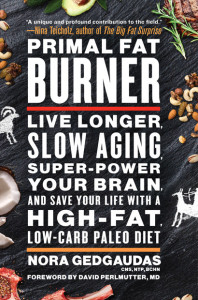Q: Every nutritionist I have ever spoken to says that the brain can only metabolize carbs. They give this as one reason so many people are suffering from depression while on low carb diets. How do you respond to that?
A: This is one of several myths perpetuated by “classically” trained nutritionists and medical doctors, and consequently believed by most people—that glucose is, of necessity, the body and brain’s primary fuel and completely essential at all times. This is 100% completely wrong—or is at least only conditionally true. The dependence on glucose is true IF—and only if—one has conditioned ones-self to be metabolically dependent on sugar as one’s primary source of fuel. The only tissues in the body absolutely dependent on glucose are your red blood cells. They feed anaerobically so they can preserve their precious cargo which is oxygen. Everything else in the human body, however, can function just beautifully and consistently on ketones. A person metabolically dependent, instead, on fat (a much more natural state for humans) as the primary fuel source has no such fundamental requirement for glucose. The evidence in the literature and basics of human physiology show unmistakably that the brain and body function far more efficiently, age more slowly and suffer far less oxidative stress when depending on ketones (and a few free fatty acids) instead of sugar (glucose) for one’s primary source of fuel. I showed textbook evidence to this effect in my book, Primal Body-Primal Mind.
That people are more likely to feel “depressed” on a low carb diet is patently absurd and completely contrary to the scientific and overwhelming empirical evidence. A dependence on sugar means your moods are always dependent on where the glucose is swinging next and in my experience there is no more destabilizing effect on mood than a glucose-dependent metabolism. Your body is obsessed with maintaining the lowest level of glucose at any given time due to its inherently damaging nature, so you constantly need to replenish it if you’re trying to depend on it. Interestingly, however, EVEN if you’re dependent on glucose for your primary source of fuel you can make all you need from a combination of protein and fat in the diet and never, ever have to actually consume any sugar or starch at all. Your liver will make all you need…but I’d rather spend my metabolic energy doing other things, personally. Fat, on the other hand, is even-burning and readily sustained, leading to a far more even temperament, elevated mood and clear cognitive functioning—once you have adapted to using fat as your primary source of fuel. This isn’t as hard to accomplish at all as you (or they) might think. In fact, it can be quite easy. There may be a brief interim period before a fat burning metabolism is fully operational—especially in a carb-addicted person– where “low blood sugar symptoms” can occur in the early stages of a ketogenic diet, but this is not an inescapable issue and is easily remedied with temporary supplementation with L-glutamine and/or the herb Gymnema (see my blog article: “Taming the Carb Craving Monster”). For some the problem isn’t “low blood sugar” so much as what were actually depressed L-tryptophan levels, but that is a more involved subject. Ultimately you no longer have to be dependent on “blood sugar” and can eliminate this albatross from your mood and cognitive equation—the same way our Ice Age ancestors once did.
Sugar is an anaerobic source of turbo-powered energy that’s truly needed only for brief bursts of major exertion or in an emergency. We’re meant to use glucose only sparingly which is, of course, a very good thing. Glucose by itself attracts a great deal of free radical activity and oxidative damage and is an exceedingly volatile and unreliable source of fuel. It’s like relying on kindling all the time to heat your house….you’d never be able to focus on anything else. The food industry and monoculture agricultural industry (who love the way “classical” nutrition and medicine are taught and profit from that handsomely) are only too happy to have you think you can’t have it any other way. Just eat lots of small meals all the time—eat lots of “complex carbs” (yeah—use twigs instead of paper on the fire) and eeeeeverything will be OK.
IF, however, you’re using fat as your primary source of fuel and your body has sufficiently adapted to that reality then eating becomes more of a choice than a necessity and you can go for much longer periods of time without the need to snack and without the cravings and meal preoccupation that comes with a high—or even a moderate carbohydrate diet. You might just find yourself buying far less at the grocery store, making better food choices when you do eat (because cravings will be gone), you’ll have more energy more of the time, a better mood and better brain function, will be sick less often and may just find yourself saving a fortune on grocery AND medical bills.
OR, you could just assume I’m crazy and live on glucose, just like they say. I suspect, though, that you’d enjoy fat burning a whole lot more.
~ Nora





Awesome Answer! I live the way you explain how our systems operate. I have been eating a low carb diet for about 3 years now and have never, and I mean never , felt better. I rarely get sick and if I do, its with just a cold and it last days instead of weeks. I cant remember the last time I had an upset stomach, I have more energy and can work all day without stoping. My mind seems clearer, no sleepytime in the middle of the day anymore…gotta love this way of life. I wish everyone would get this message. We wouldnt need to revamp the health care system. It would take care of itself.
Bill
Amazing post, Nora.
I have most definitely noticed a more serene disposition combined with more energy when eating healthy (or not eating at all!).
One wonders why I don’t do it more often.
Thanks for the blog, your newsletter, and your future efforts!
I didn’t mean to leave the open emphasis tag! Only for the word “only” to be italicized.
Hi,
This is interesting as having been on low carb for about a year I have reduced my anti-depressant dosage and feel so much happier. I appreciate that this could be due to any number of different factors but I’m now happy.
Thanks
I read your book and found it so great. I tried the ketogenic diet for almost a year. I’ve always suffered from insomnia since I was a teenager. But when going very low carb, my insomnia (if possible) got even worse.
I’ve seen so many doctors, but nobody really knows what’s wrong with me. The typical diagnosis is: “you’re stressed, depressed, etc.” – so I stopped going to the doctor and started saving money, also because I’ve never taken an antidepressant drug.
After a year of ketogenic diet, I became hypothyroid (at least according to my lab tests which were ok earlier) and developed several allergies to most of the (paleo) foods I eat. Moreover, my skin became very dry with strong dermatitis on my face.
Now, after reading Paul Jaminet’s book, I reintroduced some “safe starches”. Insomnia has improved (able to sleep 4-5 hours with “just” one awakening) as well as food allergies.
I loved the ketogenic diet, which was very helpful for my SIBO, but unfortunately, it didn’t help with my worst nightmare: my insomnia. My life still sucks, but a little less. If you had any advice, I would love to hear your thoughts about it and understand if the ketogenic diets proves to be successful with insomniac patients.
Thanks a lot and happy new year.
Patel-
I have only been on a ketogenic diet for less than 6 months and have lots almost 50 lbs. The best part is that my moods / emotions are much more in check now. I do get upset on occasion which is only natural I suppose but it is controllable and passes very quickly.
Just before I went on the diet I was having suicidal thoughts which were getting more intense. This was coupled with weight gain and always being hungry due to having metabolic syndrome / pre-diabetic. I no longer have those thoughts or anything even close.